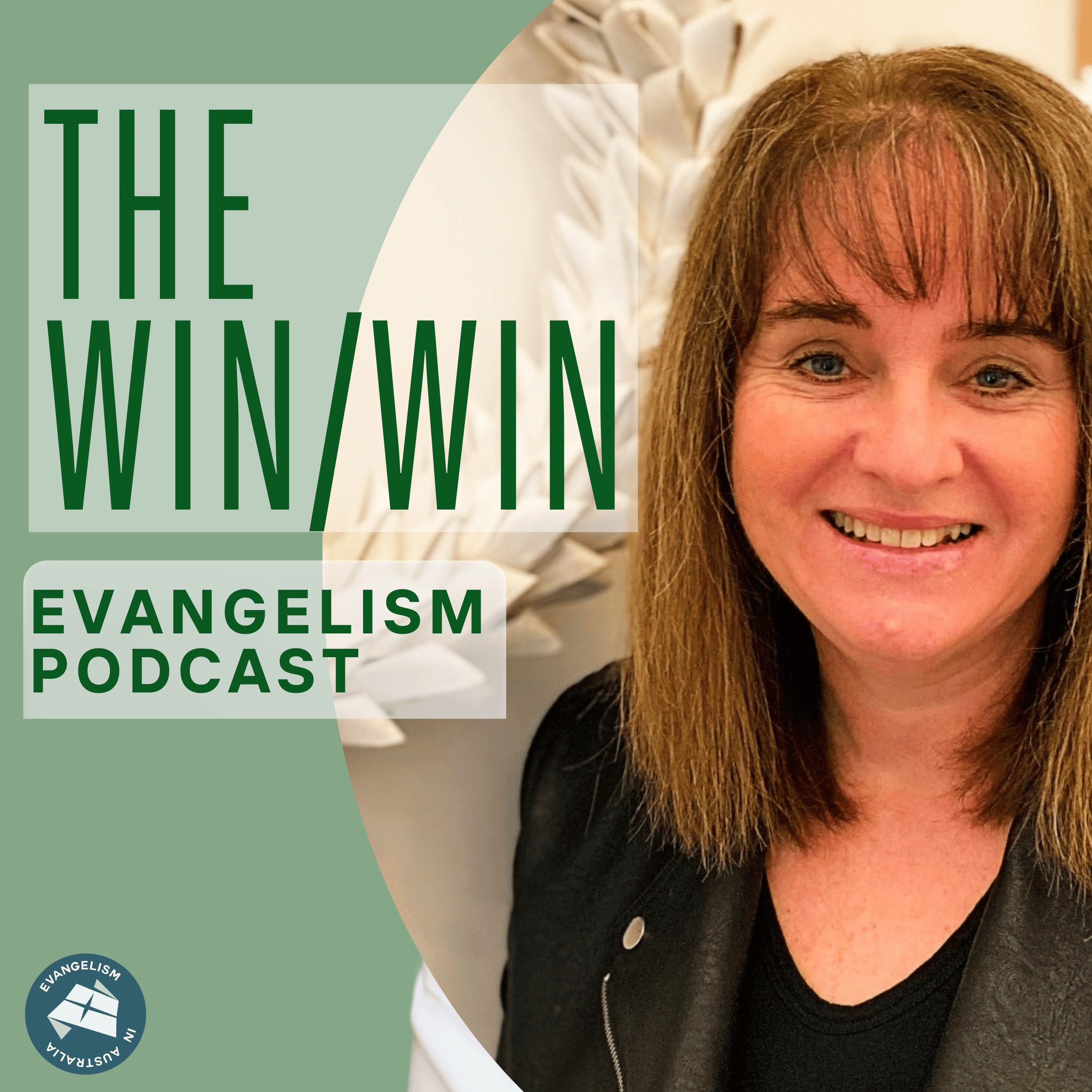 |
The WIN WIN Evangelism PodcastAuthor: Evangelism In Australia
Tina Waldrom from Evangelism In Australia interviews church leaders and congregation members alike to discover how they are reaching out to others with the gospel. These stories reveal some wonderful insights to keep the church equipped and encouraged to stay focused on outreach. Language: en Genres: Christianity, Religion & Spirituality Contact email: Get it Feed URL: Get it iTunes ID: Get it |
Listen Now...
How Community Engagement and Evangelism Work Together
Episode 291
Monday, 7 July, 2025
In this episode, Tina Waldrom dives into how community engagement and evangelism work together by speaking with three experienced leaders—Phil Smith, Scott Hawkins, and Marcus Watson. Each of them shares down-to-earth advice on how churches can build genuine relationships with the people in their local areas. They talk about the power of simply showing up, being present, and keeping things uncomplicated. Instead of waiting for big moments, these leaders encourage trying new things, even if they don’t always go to plan—because that’s how meaningful growth happens in both faith and outreach. The conversation is a practical and inspiring reminder that evangelism isn’t just about preaching; it’s about loving your neighbour and meeting real needs. Tina and her guests challenge listeners to take a fresh look at their church’s role in the community. Are we making space for connection? Are we listening and learning from the people around us? This episode will help you see how small, intentional actions can open big doors for sharing Jesus. If you've ever wondered how community engagement and evangelism work together, this conversation offers clarity, encouragement, and plenty of ideas to start where you are. In this podcast episode, you will discover that: Church should model radical simplicity in community engagement. Presence in the community is essential before preaching. Church work and community work should not be separated. Engaging with local pain points is crucial for effective outreach. Church leaders should reflect on their community impact regularly. Churches should embrace their neighbourhoods as primary mission fields. And more… *SUPPORT THIS PODCAST – BUY ME A COFFEE – MORE INFORMATION HERE. *OUR ONLINE LEARNING & COURSES Share Jesus Membership On Mission with God @Home (free sample) On Mission with God @Home (Full Course Details) 3 Day Evangelism Challenge *OTHER PODCAST EPISODES LINKED TO THIS How to Go & Heal Your Neighbourhood with Phil Smith Leading a Church into the Community with Scott Hawkins Helping Churches Get Into The Neighbourhood with Markus Watson *STAY CONNECTED TO PHIL SMITH BELLS Neighbourhood Church - Website BELLS Neighbourhood Church - Facebook BELLS Neighbourhood Church - Instagram BELLS Neighbourhood Church - YouTube Phil Smith - Facebook *STAY CONNECTED TO SCOTT HAWKINS Urban Life - Website Urban Life - Facebook Urban Life - Instagram Scott Hawkins - Facebook *STAY CONNECTED TO MARKUS WATSON Markus Watson - Website Markus Watson - Facebook Markus Watson - Instagram Markus Watson - LinkedIn *GET THE LATEST INFORMATION FROM EVANGELISM IN AUSTRALIA Subscribe to EIA EIA Website EIA YouTube Channel EIA Instagram EIA Facebook Tina Waldrom on Facebook Tina Waldrom on Instagram Discussion Questions 1. How can I personally “move into the neighbourhood” and be present where people are, instead of expecting them to come to me? Reflect on how you can live a life of incarnational presence. What does it look like to be with people in your neighbourhood rather than simply doing church for them? Read: 📖 John 1:14 (MSG) — “The Word became flesh and blood, and moved into the neighbourhood.” 📖 Luke 10:9 — “Heal the sick who are there and tell them, ‘The kingdom of God has come near to you.’” 2. In what ways does hospitality reflect the heart of the gospel, and how can I practice it more intentionally? How might shared meals, open homes, or simple conversations become sacred spaces for evangelism? Read: 📖 Romans 12:13 — “Share with the Lord’s people who are in need. Practice hospitality.” Rosaria Butterfield: “Hospitality is the ground zero of the Christian life.” 3. What are the real needs in my community, and how is God already at work there? Take a walk in your neighbourhood this week. Listen, observe, and ask: What is God already doing here? How can I join in? Read: 📖 Jeremiah 29:7 — “Seek the peace and prosperity of the city... Pray to the Lord for it, because if it prospers, you too will prosper.” 📖 Philippians 2:4 — “Let each of you look not only to his own interests, but also to the interests of others.” 4. Are we, as a small group or church, serving more than we’re spending on ourselves? Review your time, energy, and finances. How much is being invested outwardly toward your community? Read: 📖 Acts 20:35 — “It is more blessed to give than to receive.” William Temple: “The church is the only society that exists for the benefit of those who are not its members.” 5. Am I willing to take risks, even fail, in order to follow the Holy Spirit into new areas of mission? What “safe” patterns in my life or church need to be let go so I can step out in faith? Read: 📖 Isaiah 43:19 — “See, I am doing a new thing! Now it springs up; do you not perceive it?” Marcus Watson: “Failure can be a gift... The church must risk and even fail as it follows the Holy Spirit out of its walls and into the world.” 6. What would change if we saw our neighbourhood as our primary mission field? What does it mean for your group or church to be the light, not just look polished? What practical steps could you take this week to begin? Read: 📖 Matthew 5:14–16 — “You are the light of the world... let your light shine before others.” Hudson Taylor: “The Great Commission is not an option to be considered. It is a command to be obeyed.” 7. How can we cultivate a rhythm of action and reflection to stay aligned with God’s mission? Start a monthly rhythm of missional reflection. Ask: What are we learning about God’s mission here? Read: 📖 Mark 6:30–31 — “The apostles gathered around Jesus and reported to him all they had done and taught... Come with me by yourselves to a quiet place and get some rest.” Marcus Watson’s practice: Experiment → Reflect → Adapt.








